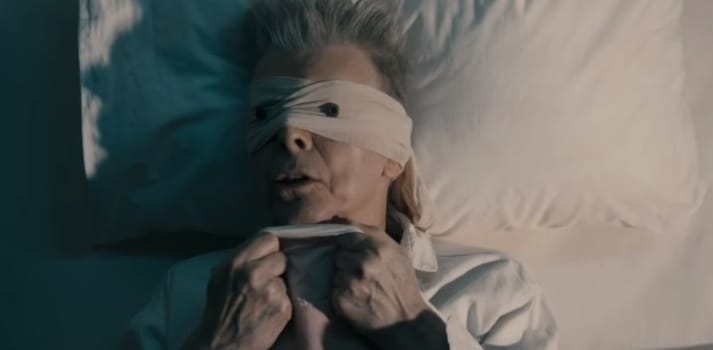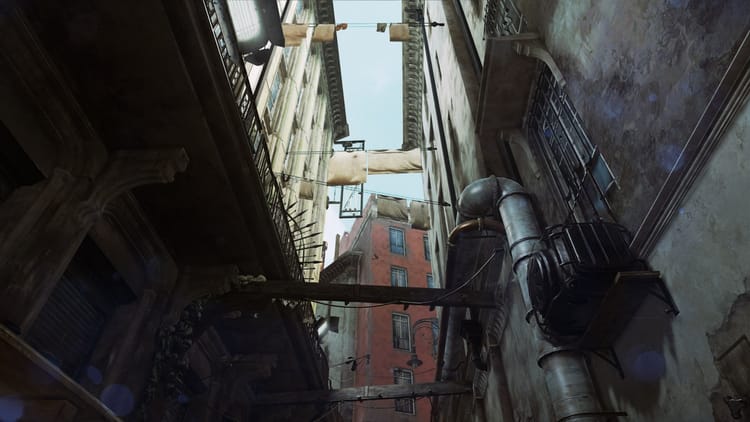Blackstar won’t tell you how to die

I spent a lot of time this week listening to “Subterraneans,” the last song on 1977’s Low, by David Bowie. I didn’t know what else to do. Like a lot of other people, I had a feeling—this response to death we all have, with varying degrees of terror and/or sadness attached to it—combined with the uselessness of just being on the internet, looking for something to do. And so we (I) look for more David Bowie, or we (I) listen to more David Bowie, because all of it’s still right there, right where we (I) left it. We sort of rummage around for new eulogies, get into conversations about albums and songs, publically remember moments of connection with him, in his various guises and vocations. (There are a lot of Labyrinth fans out there, apparently.) These understandable, human impulses eventually tip into something much less savory, but no less expected: performative grieving, neatly incorporated into somebody’s ongoing personal brand, or, worse, an actual corporate brand co-opting the death. We eye these with disdain and move on. We find another eulogy.
The routine of internet grief
This is the routine—now familiar—of internet grief. We’ve done it enough that we know what to do and even what not to do. What’s different about David Bowie’s death is the knowing, almost canny way it was anticipated by the artist himself. I’m speaking of Blackstar, the album he released just days before dying, as well as its music videos, and the off-Broadway production Lazarus—a combined artistic effort that sucks in, accommodates, and ultimately overpowers all these acts of massive, public grieving. Our impulse, in these situations, is to create narratives and order; to eulogize and create legacies; and, in our worst moments, to fight over ownership, over greatest-possible identification, with whoever else might lay claim to it. There needs to be something to do with that feeling, after all. The inverse of this tendency is a retreat into stories, to bid adieu tidily and fantastically: Satoru Iwata mourned over by Kirby and Mario; Robin Williams’ suicide transposed into a freed genie; Jim Henson tearfully played offstage by Kermit; David Bowie, returned at last to Mars. These sentiments help us deal with the fact that a human who was alive no longer is. But they also hide the fact. They soften truths, in the exact way science fiction and fantasy should not.
Blackstar is not tidy. It is science fiction and fantasy the way Bowie always understood it: as a license for wild, unrestrained creativity, and as a reflection of our present. In this case, it was a way for its creator to make sense of terminal cancer. It fits, then, into a tradition of art made while actively dying: Mozart, the story goes, composed the Requiem for himself; James Joyce completed Finnegans Wake while totally blind on his deathbed; J. Dilla sat up punching out beats on his SP-303 as he succumbed to lupus. Blackstar fits into this canon uneasily, sucking the light out of the room. David Bowie aged with proverbial grace, a public symbol of sexual confidence and worldliness as his career stretched into its fourth and fifth and sixth decade. But the actual matter of Blackstar, despite the presence of Bowie’s impossibly fine falsetto, gives us no extraterrestrial, otherworldly advice on how to die. “Where the fuck did Monday go?” he asks repeatedly on “Girl Loves Me,” expressing not the sanguinity we’d hope from old age but a frank anger at the passage of time. The album begins with imagery of a death cult, and closes with no hard-earned peace; “I Can’t Give Everything Away” remains unresolved, beginning with the sentiment that “something is very wrong” and ending with that heart-breaking lament and an almost unfinished guitar solo. In the video for “Lazarus,” he lurches from his bed in distress, and the abler Bowie that emerges from a darkened, coffin-like armoire scribbles furiously at a desk, trying desperately to get as much ink out of the pen as possible. He runs out of paper and starts scribbling on the sides of the desk before slinking back into the armoire.
His death two days later is impossible to extricate from the artwork, in part because Bowie’s longtime collaborator, Tony Visconti, immediately tied them together. We’ll never shake the phrase “parting gift” from Blackstar. It sustains the myth of David Bowie, even as the album dispels it. On Blackstar, Bowie publicly fears death. He shakes in his deathbed. He yearns to create more, to reach “the English evergreens” he’s running towards—and knowing that he will not, weeps. And then the album ends. That Blackstar so nakedly and directly talks about death will not change the way anybody talks about it—the album or death itself—nor will it provide a frame for our many posthumous discussions about David Bowie, what he meant, and what he created. But it is worth at least listening to Blackstar as a suggestion, and beginning to talk about the album not as some cosmic press release from the beyond but as an eloquent forecast of what it will be like to die. To do anything less would be to mistake Bowie’s medium—science fiction—for his message.
An eloquent forecast of what it will be like to die
On the other hand: at its root, immortality does not necessarily mean living forever but instead not dying. Those of us who have only interacted with Bowie through his art can sustain that relationship. We can have the feeling that accompanies death, but the exponentially refracting nature of Bowie’s work—the way Lodger glints off Outside and Major Tom finds a denouement on “Blackstar,” the way Earthling bounces off of Twin Peaks or the way “Subterraneans” crawls between melancholy and hope—will change over time, but it will not die. To wit: There are 26 David Bowie albums, they’re pretty much all great except for Tin Machine, and “Let’s Dance” will slay at every wedding you ever go to. If you like Labyrinth, you’ll still have Labyrinth. Humans are not immortal; art is. This is the sentiment we find comfort in when we imagine artists carried off by their creations, or when we treat them, in death, like the characters they portrayed, whether it’s a Disney genie or Ziggy Stardust. Blackstar, while utterly alive with the fantastical, and so an unimaginably graceful conclusion to Bowie’s body of work, urges us to also take the frightening step of considering its creator’s death as a biological fact. In so doing it tells us not how to die but how to live: to make and consume beauty with every breath that we have, and to do so with absolute, terrifying honesty.



